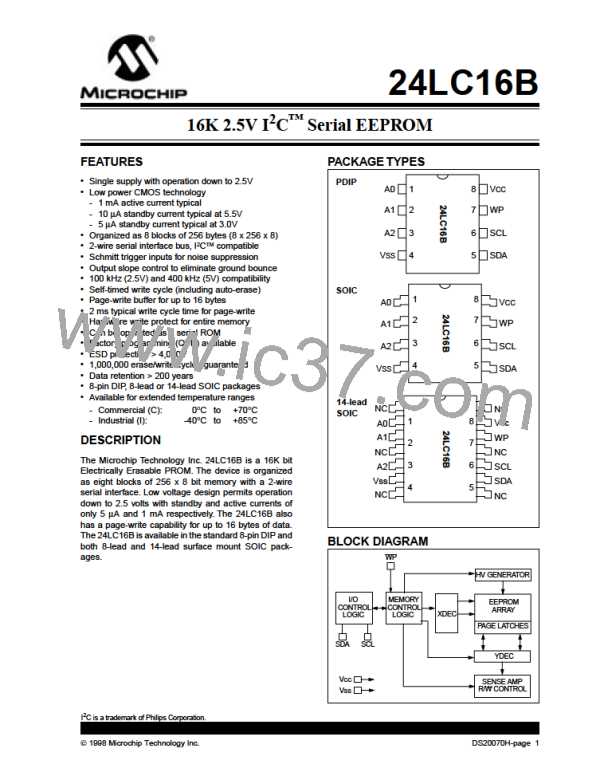24LC16B
5.0
ACKNOWLEDGE POLLING
7.0
READ OPERATION
Since the device will not acknowledge during a write
cycle, this can be used to determine when the cycle is
complete (this feature can be used to maximize bus
throughput). Once the stop condition for a write com-
mand has been issued from the master, the device ini-
tiates the internally timed write cycle. ACK polling can
be initiated immediately.This involves the master send-
ing a start condition followed by the control byte for a
write command (R/W = 0). If the device is still busy with
the write cycle, then no ACK will be returned. If the
cycle is complete, then the device will return the ACK
and the master can then proceed with the next read or
write command. See Figure 5-1 for flow diagram.
Read operations are initiated in the same way as write
operations with the exception that the R/W bit of the
slave address is set to one. There are three basic types
of read operations: current address read, random
read, and sequential read.
7.1
Current Address Read
The 24LC16B contains an address counter that main-
tains the address of the last word accessed, internally
incremented by one. Therefore, if the previous access
(either a read or write operation) was to address n, the
next current address read operation would access data
from address n + 1. Upon receipt of the slave address
with R/W bit set to one, the 24LC16B issues an
acknowledge and transmits the eight bit data word.The
master will not acknowledge the transfer but does gen-
erate a stop condition and the 24LC16B discontinues
transmission (Figure 7-1).
FIGURE 5-1: ACKNOWLEDGE POLLING
FLOW
Send
Write Command
7.2
Random Read
Send Stop
Condition to
Random read operations allow the master to access
any memory location in a random manner. To perform
this type of read operation, first the word address must
be set.This is done by sending the word address to the
24LC16B as part of a write operation. After the word
address is sent, the master generates a start condition
following the acknowledge. This terminates the write
operation, but not before the internal address pointer is
set. Then the master issues the control byte again but
with the R/W bit set to a one. The 24LC16B will then
issue an acknowledge and transmits the 8-bit data
word. The master will not acknowledge the transfer but
does generate a stop condition and the 24LC16B dis-
continues transmission (Figure 7-2).
Initiate Write Cycle
Send Start
Send Control Byte
with R/W = 0
Did Device
NO
Acknowledge
7.3
Sequential Read
(ACK = 0)?
Sequential reads are initiated in the same way as a ran-
dom read except that after the 24LC16B transmits the
first data byte, the master issues an acknowledge as
opposed to a stop condition in a random read. This
directs the 24LC16B to transmit the next sequentially
addressed 8-bit word (Figure 7-3).
YES
Next
Operation
6.0
WRITE PROTECTION
To provide sequential reads the 24LC16B contains an
internal address pointer which is incremented by one at
the completion of each operation. This address pointer
allows the entire memory contents to be serially read
during one operation.
The 24LC16B can be used as a serial ROM when the
WP pin is connected to VCC. Programming will be
inhibited and the entire memory will be write-protected.
7.4
Noise Protection
The 24LC16B employs a VCC threshold detector circuit
which disables the internal erase/write logic if the VCC
is below 1.5 volts at nominal conditions.
The SCL and SDA inputs have Schmitt trigger and filter
circuits which suppress noise spikes to assure proper
device operation even on a noisy bus.
DS20070H-page 6
1998 Microchip Technology Inc.

 ETC [ ETC ]
ETC [ ETC ]